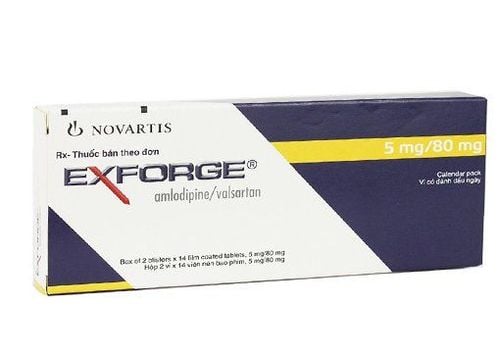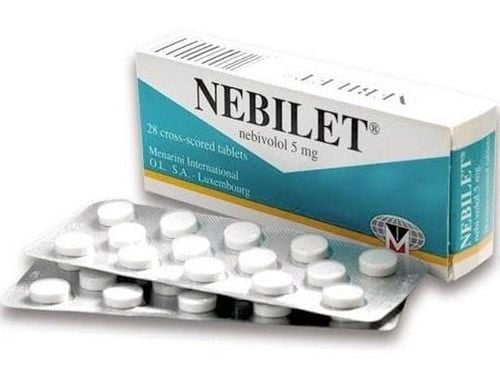This is an automatically translated article.
Angiotan-H-Tablets has the main active ingredient: Valsartan with a strength of 160mg and Hydrochlorothiazide with a strength of 25mg. Angiotan-H-Tablets are used in the treatment of hypertension in people whose blood pressure is not controlled with monotherapy.
1. What is Angiotan-H-Tablets?
Angiotan-H-Tablets has the main active ingredient Valsartan 160mg and Hydrochlorothiazide 25mg. Angiotan-H-Tablets is prepared in the form of film-coated tablets, suitable for direct oral use. Packaging method is a box of 1 blister containing 14 pills. Used in the treatment of hypertension in people whose blood pressure is not controlled with monotherapy.2. What are the effects of Angiotan-H-Tablets?
Angiotan-H-Tablets is used in the treatment of the following pathologies:
Angiotan-H is a combination tablet with 2 components including Valsarlan an Angiotensin II receptor blocker and Hydrochlorothiazide belonging to the diuretic group. Angiotan-H-Tablets is indicated in the treatment of hypertension in people whose blood pressure is not controlled by monotherapy. Angiotan-H-Tablets are also indicated as initial therapy for people who need to use a combination of drugs to achieve blood pressure goals.
3. Usage and dosage of Angiotan-H-Tablets
3.1. How to use the drug Angiotan-H-Tablets is prepared in the form of film-coated tablets, suitable for direct oral use. This is a drug that requires a prescription from a doctor.
3.2. Dosage of the drug The usual starting dose is one tablet once a day. Clinical responses should be assessed after initiation of therapy and, if necessary, the dose of Angiotan-H-Tablets can be increased to 320 mg/25 mg by using another tablet of appropriate strength. For patients with renal impairment: No dose adjustment is required for patients with mild to moderate renal impairment. Due to the active ingredient Hydrochlorothiazide, it is contraindicated in people with severe kidney disease. Hepatic impairment: In subjects with mild to moderate hepatic impairment without concomitant cholestasis, the dose of Valsartan should not exceed 80 mg. No dose adjustment of Hydrochlorothiazide is required for patients with mild to moderate hepatic impairment. Due to the composition of Valsartan, it is contraindicated in people with severe liver failure or biliary cirrhosis and cholestasis.
4. Undesirable effects of Angiotan-H-Tablets
During the use of Angiotan-H-Tablets, you may experience the following undesirable effects:
Headache, dizziness, dizziness, fatigue, upper respiratory infection, cough, back pain , diarrhea. Post-marketing data of Angiotan-H-Tablets show that in rare cases angioedema, erythema, pruritus and hypersensitivity reactions including serum sickness and vasculitis. Changes in parameters in laboratory tests: more than 20% decrease in serum potassium, increase in serum creatinine, and metabolic and electrolyte disturbances.
5. Angiotan-H-Tablets drug interactions
The antihypertensive effect is increased when Angiotan-H-Tablets are combined with other antihypertensive drugs. Using Angiotan-H-Tablets in combination with potassium supplements, potassium-sparing diuretics, salt substitutes containing potassium, or drugs that increase serum potassium levels (heparin...) serum potassium concentration test. Reversible increases in serum concentrations of sedation and toxicity have been reported with the co-administration of Angiotan-H-Tablets with ACE inhibitors and thiazides.
6. Some notes when using Angiotan-H-Tablets
6.1. Contraindications of the drug Angiotan-H-Tablets Those who are sensitive or sensitive to any of the ingredients of the drug. Pregnant women. People with severe liver failure, biliary cirrhosis and cholestasis. Patients with anuria, severe renal failure with creatinine clearance < 30 ml/min. People with hypokalemia, hyponatremia, prolonged hypercalcemia and symptoms of hyperuricemia. 6.2. Using Angiotan-H-Tablets with special subjects Pregnant women: Due to the mechanism of action of Angiotensin II receptor antagonists, a risk factor for the fetus cannot be excluded. There have been reports of fetal exposure to ACE inhibitors in utero during the second and third trimesters, causing multiple fetal harm or death. There have also been reports of spontaneous abortion, oligohydramnios, and renal dysfunction in neonates when pregnant women used drugs containing the active ingredient valsartan. Before prescribing Angiotan-H-Tablets, physicians should inform women of childbearing potential about the potential risks of the drug to the fetus. If pregnancy is detected during treatment with the drug, the use of Angiotan-H-Tablets must be stopped as soon as possible. Lactation: It is not known whether valsartan is excreted in human milk, but valsartan was distributed into milk in studies in rats. Therefore, Angiotan-H-Tablets should not be used in nursing women. Effects on driving and operating machines: Angiotan-H-Tablets may cause a risk of hypotension, dizziness, dizziness. Therefore, while using the drug, you need to be careful when driving or operating machinery that requires high concentration. Angiotan-H-Tablets has the main active ingredient Valsartan with a strength of 160mg and Hydrochlorothiazide with a strength of 25mg. Angiotan-H-Tablets are used in the treatment of hypertension in people whose blood pressure is not controlled with monotherapy. To ensure the effectiveness of treatment and avoid unwanted side effects, patients need to strictly follow the instructions of the doctor, professional pharmacist.
Follow Vinmec International General Hospital website to get more health, nutrition and beauty information to protect the health of yourself and your loved ones in your family.
Please dial HOTLINE for more information or register for an appointment HERE. Download MyVinmec app to make appointments faster and to manage your bookings easily.













